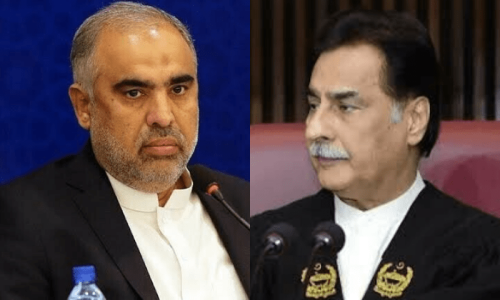HOW has the world responded to Israel’s continuing war on Gaza and the humanitarian catastrophe there? Clearly, the UN Security Council failed in its duty to stop hostilities. This from a world body whose primary responsibility is to maintain international peace and security.
Its inability to pass resolutions calling for a truce or humanitarian pause exposed the polarisation among its members which paralysed the Council. The US was the principal stumbling block in efforts to achieve a ceasefire. Its unconditional support for Israel handed Tel Aviv carte blanche to continue its barbaric military campaign in utter disregard for world opinion.
The Security Council’s inaction led to an emergency session of the General Assembly, which approved, by an overwhelming majority, a resolution calling for a truce. Only the US and a handful of countries voted ‘no’. While this resolution has moral and political weight and aimed to mount diplomatic pressure on Israel and its backers, it is non-binding. Therefore, it could do nothing to end Israel’s war on Gaza.
These developments demonstrated America’s increasing diplomatic isolation as several of its Western allies joined most of the international community to back an immediate ceasefire. While some European countries shifted their position to voice concern for the humanitarian crisis and loss of Palestinian lives, Washington refused to ask Israel to cease its bombardments or lift the siege of Gaza, showing indifference to the devastating humanitarian consequences of Israeli actions.
UN officials repeatedly declared that Israeli violence directed at over two million Palestinians trapped in Gaza was collective punishment and violated international humanitarian law. But the US and its Western partners only called out Hamas for the attack on Israel and accepted Israel’s carpet bombing of an entire population as Israel’s ‘right to defend itself’.
They showed no compassion for thousands of Palestinian casualties, who were portrayed as human shields for Hamas — an egregious example of dehumanising Palestinians. President Joe Biden even questioned Palestinian casualty figures saying he had “no confidence in the numbers the Palestinians are using”. When Washington began to voice concern for civilian deaths it was too little, too late especially as it continued to oppose a ceasefire.
These developments laid bare the US-led West’s hypocrisy. While Western leaders denounced Russian military actions and targeting of civilians in Ukraine, they refused to apply the same principle to Gaza.
The EU Commission president Ursula von der Leyen once characterised Russia’s “attacks on civilian infrastructure” that aimed to deprive people of water and electricity as “acts of pure terror”. But neither she nor any Western leader chose to describe Israel’s action of cutting off electricity, water, food and fuel supplies to Gaza in a similar way.Nor did Israel’s use of white phosphorous in indiscriminate artillery attacks urge Western governments to denounce this violation of international humanitarian law.
There was no Western condemnation of Israel’s attacks on Jabalia refugee camp in which scores of people were killed and for which Tel Aviv claimed responsibility, justifying civilian deaths as a ‘tragedy of war’.
Public outrage over the humanitarian disaster is in sharp contrast to the position of Western governments.
Western countries who claim to be standard bearers of human rights and constantly lecture other countries on this adopted a deafening silence on Israeli atrocities and genocidal actions. This display of double standards was not new. Western concern for human rights has always been selective, its criticism usually directed at adversaries and opponents, while friendly countries have been shielded from censure.
Germany and France imposed a ban on pro-Palestinian rallies in a bid to criminalise expressions of sympathy for Palestinians. This made a mockery of their democratic credentials and showed the shallowness of their commitment to freedom of expression. In the US, donors threatened to cut off funding to universities where students rallied in solidarity with Palestinians.
The Guardian reported that prominent American figures from magazine editors to Hollywood agents faced sackings or rebuke for supporting Palestinians. Elsewhere in Europe, pro-Palestinian activists were hounded on the pretext of being antisemitic. In the UK, Home Secretary Suella Braverman branded pro-Palestinian demonstrations as “hate marches’, called for curbs on protests and urged criminalising waving the Palestinian flag. All this in so-called democracies who claim civilisational superiority over countries of the Global South.
The Western media’s role has been as one-sided as that of their governments and blind to the suffering of the Palestinian people. Major networks echoed Israeli propaganda and mostly covered the war from the prism of ‘Israel’s right to defend itself’. Western TV anchors seemed to read from the same script and disregarding massacres carried out by Israel, kept asking interviewees if they condemned Hamas.
The most flagrant example of disinformation spread by Western channels was of Israeli babies beheaded by Hamas, which had no basis in fact. Only when the scale of killings in Gaza could not be ignored and criticism of their bias mounted did networks such as BBC change course to cover these. Meanwhile, Western social media companies censored Palestinian content, as confirmed by international human rights organisations including Amnesty.
The response from Muslim countries neither matched the catastrophic situation on the ground nor met the expectations of their own people. Other than diplomatic activism at the UN to secure a General Assembly resolution, it did not go beyond issuing denunciations of Israel. While several South American countries cut ties with Israel only Jordan and Bahrain did so from among Arab states who had established diplomatic relations with Tel Aviv.
Does all this mean the Palestinians have been abandoned? Yes and no. Yes, because the international community failed to stop the carnage in Gaza. No, because across the world, from west to east, people came out in unprecedently large numbers to show solidarity with the Palestinians and demand a ceasefire.
Public outrage over the humanitarian disaster expressed in protest rallies was in sharp contrast to the pusillanimous position adopted by their governments. Public opinion in the US was also at sharp variance with the Biden administration’s stance. A Data for Progress poll found 66 per cent of American voters supported a ceasefire.
The consequences of the biggest disaster to befall the Palestinian people since 1948 will be far-reaching for the region and for the world. I will take that up in another column.
The writer is a former ambassador to the US, UK and UN.
Published in Dawn, November 6th, 2023















































Dear visitor, the comments section is undergoing an overhaul and will return soon.